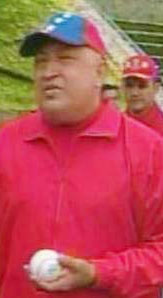Venezuelan daily El Universal yesterday reported President Hugo Chávez as saying that the Governments of Venezuela and Guyana had agreed to handle their border controversy at the highest level and in a very responsible manner.
Chávez, it was reported, made the comments in the course of a telephone call to state TV station Venezolana de Television early yesterday morning. He was quoted as saying that his government was undertaking intensive work on the issue, and would not allow “some sectors there [Guyana] or here [Venezuela] to create internal conflicts. We will not let that happen.”
The Caracas daily El Nacional reported him as going on to emphasize that Venezuela and Guyana were two brother countries which would not enter into an international conflict on account of the actions of some internal factions in both.

The local Ministry of Foreign Affairs issued a statement yesterday afternoon in which it said that the foreign ministers of Guyana and Venezuela—Carolyn Rodrigues-Birkett and Nicolas Maduro will meet in Port of Spain today.The release said the meeting was mutually agreed by the governments of Guyana and Venezuela. It added that “Professor Norman Girvan, the personal representative of the Secretary-General of the United Nations” has been invited to be present at the meeting.
“Guyana has finally joined the Union of South American Nations [Unasur],” El Universal quoted Chávez as observing, “but of course we defend our national interests first and therefore we agreed to handle this issue very responsibly.”
“I assume the tasks that the people have vested in me as head of state, with [a sense of] responsibility and without being subordinate to any foreign power,” the Venezuelan President said.
Meanwhile the new umbrella opposition alliance in Venezuela, the Unified Democratic Panel (MUD), issued a statement criticizing the release issued by the Government of Venezuela on Monday relating to Guyana’s claim to an extended continental shelf. Writing on behalf of MUD, Omar Barboza described the Venezuelan government response as “completely insufficient.
“With this statement, Guyana ignores the very existence of our claim and it seems to ignore the Geneva Agreement of 1966…“ El Universal quoted him as saying.
Official notice in 2009
El Universal has confirmed from Venezuelan sources the contention of Takuba Lodge that the Venezuelan Embassy in George-town was given official notice of Guyana’s intention to submit a claim for an extended continental shelf under the UN Convention on the Law of the Sea (UNCLOS) in May 2009.
In the statement issued on Monday by Miraflores, the Venezuelan government had expressed its concern that Guyana had not informed Caracas about its submission to UNCLOS prior to September 7, 2011. Guyana had formally submitted its claim to UNCLOS the day before on September 6.
On Tuesday, however, Guyana’s Ministry of Foreign Affairs in a statement said that the Venezuelan Embassy here had been provided in May 2009 with a note verbale and the information which had been submitted in its claim, with the exception of adjusted coordinates for the outer limits of the shelf which were based on seismic data obtained after that time.
El Universal, however, reported that it had seen a telefax which Ambassador Dario Morandy had sent on May 15, 2009, the day after Chargé d’Affaires Mercedes Mazzei had met Guyana’s Foreign Minister Carolyn Rodrigues-Birkett and head of the Frontiers Department at Takuba Lodge, Keith George.
At that meeting Mazzei had been given a note verbale with the number 590/09, dated May 13, 2009, as well as an unofficial translation and an executive summary captioned, ‘A submission of data and information on the outer limits of the continental shelf of the Co-operative Republic of Guyana.‘
The summary was a copy of the document submitted by Georgetown to the General Secretariat of the UN in 2009, containing a request to extend its continental shel f by 150 nautical miles. Morandy was not present at the meeting, the Caracas daily said, because he was on sick leave.
According to El Universal, the Venezuelan Ambassador sent a memorandum on the matter citing the number of the note verbale to the Venezuelan Ministry of Foreign Affairs, with copies to the Office of the Vice-Ministry of Foreign Affairs for Latin America and the Caribbean; the Directorate of Sovereignty, Boundaries and Border Issues; and the Special Unit for Guyana.
The Venezuelan newspaper also quoted Morandy’s comments in the memorandum relating to the claim. “We are no experts in the area,” he wrote, “but after a review of the enclosed map, it is obvious that with this action Guyana would be seeking to close Venezuela’s access to the Atlantic Ocean, which would be strategically inconvenient, in addition to the economic damage that the lack of an access to marine and oil resources in the area would cause to our country.”
According to El Universal, Morandy advised his government to issue an immediate response: “Given the importance of the issue and its strategic relevance, an urgent response from the Foreign Ministry is necessary to express the opinion of the various agencies associated with it. Further, we deem it necessary to stop, through the means deemed appropriate, the advance of Guyanese diplomacy in achieving the objectives set in their policy.”
Persistent attempts by this newspaper to obtain a comment from Ambassador Morandy have been to no avail.





